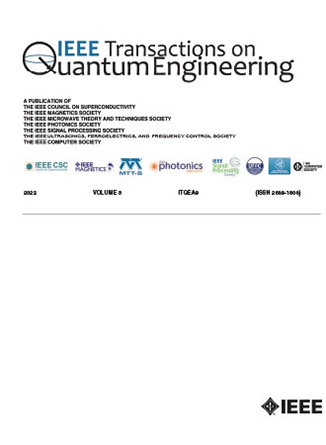Home / Publications / IEEE Transactions on Quantum Engineering

IEEE Transactions on Quantum Engineering publishes regular, review, and tutorial articles based on the engineering applications of quantum phenomena, including quantum computation, information, communication, software, hardware, devices, and metrology. Articles also address quantum-engineering aspects of superconductivity, magnetics, microwave techniques, photonics, and signal processing.
19.6 weeks
Time to Publication
–
Impact Factor
OPEN CALLS FOR PAPERS
Information on upcoming publications with open paper and poster submissions for the IEEE Photonics Society.
Description
Information for Authors
This journal is 100% open access, which means that all content is freely available without charge to users or their institutions. All articles are currently published under Creative Commons licenses (either CCBY or CCBY-NC-ND), and the author retains copyright. Users are allowed to read, download, copy, distribute, print, search, or link to the full texts of the articles published under CCBY, or use them for any other lawful purpose, as long as proper attribution is given. Articles published under CCBY-NC-ND are also available to users under the same conditions as CCBY, but the reuse cannot be for commercial purposes or change the work in any way.
Open access is provided through the payment of an article processing charge (APC) paid after acceptance. APCs are often financed by an author’s institution or the funder supporting their research.
The articles in this journal are peer reviewed in accordance with the requirements set forth in the IEEE PSPB Operations Manual (sections 8.2.1.C & 8.2.2.A). Each published article was reviewed by a minimum of two independent reviewers using a single-anonymous peer review process, where the identities of the reviewers are not known to the authors, but the reviewers know the identities of the authors. Articles will be screened for plagiarism before acceptance.
Corresponding authors from low-income countries are eligible for waived or reduced APCs.
This publication considers original works that enhance the existing body of knowledge. Original review articles and surveys are acceptable, even if new data/concepts are not presented. Results described in the article should not have been submitted or published elsewhere. Expanded versions of conference publications may be submitted. Articles must be intelligible and must be written in standard English.
Peer Review: Peer review is vital to the quality of published research. Each article submitted to IEEE is evaluated by at least two independent reviewers selected by a member of the publication’s editorial board. Learn more about the IEEE peer review process.
Publication Fees: This publication is supported by open access Article Processing Charges (APCs). An APC of $1850 is required to publish in this publication.
Errors in Published Articles: Authors who have detected an error in their published article should contact the Editor-in-Chief shown above to request the publication of a correction. Note that no change may be made to the original article after it is published in IEEE Xplore. Comment or Letter to the Editor articles which discuss an article in this publication will be considered. The authors of the original article will be given the opportunity to reply to the Comment or Letter to the Editor. Submit your Comment or Letter to the Editor article via Submit Manuscript at the top of the page.
The use of artificial intelligence (AI)–generated text in an article shall be disclosed in the acknowledgments section of any paper submitted to an IEEE Conference or Periodical. The sections of the paper that use AI-generated text shall have a citation to the AI system used to generate the text.
Other Policies:
Rodney Van Meter ![]()
Faculty of Environment and Information Studies
Keio University
Kanagawa 252-0882, Japan
tqe-eic@listserv.ieee.org
© Copyright 2024 IEEE — All rights reserved. A not-for-profit organization, IEEE is the world’s largest technical professional organization dedicated to advancing technology for the benefit of humanity.